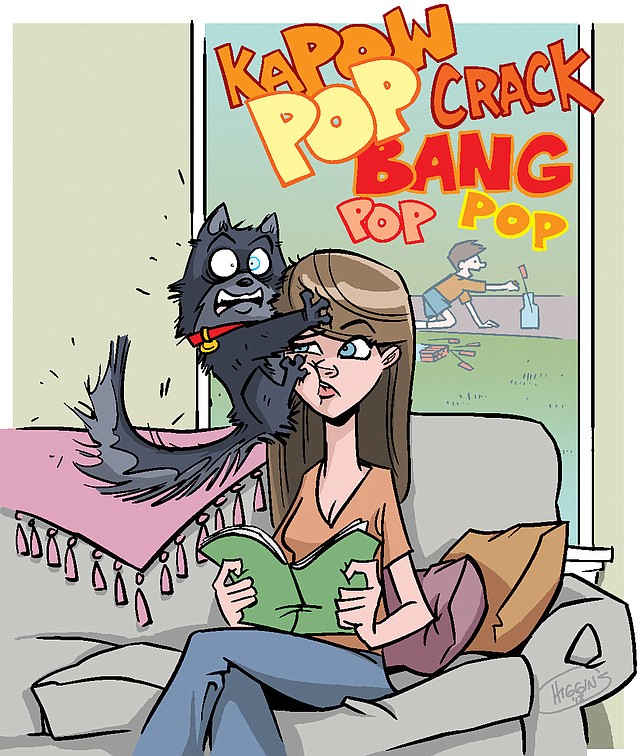Creature feature

Wednesday, July 3, 2013
I don’t know who dislikes fireworks more, me or my dog. I don’t mean the huge, pretty fireworks displays such as those you’ll see after the Pops on the River concert Thursday at Riverfront Park (although Simone doesn’t care for those either), but the annoying firecracker assaults on our ears that the noise-loving neighborhood kids (bless their hearts) subject us to each year. They make me cranky and Simone anxious.
It never fails - as soon as Simone gets up enough nerve to set a paw outside the door into her backyard to do her business, a string of loud pops will sound, sending her scurrying, tail down, back into the safety of the house.
This is never good. At some point, she’ll really need to go and if she can’t go outside, well, you know. But, for the most part, Simone copes.
And she’s safe in her house, no chance of her bolting and getting lost, as happens to many pets allowed or left outdoors unattended during “firecracker season”; firecrackers aren’t just for July 4, it seems, but also the day before and week after.
Dogs and cats can’t help their reactions to loud noises. Some are merely uncomfortable and a bit anxious like Simone, but others suffer full-blown noise phobias and react negatively to any loud sound - thunder, cars backfiring, gunshots, heavy metal music. The poor babies shake, tremble, cry, bark, howl, refuse to eat, try to escape from the house or yard or become temporarily incontinent. In some it even triggers seizures.
But there are strategies pet owners can take to lessen their pets’ distress.
Long term solutions include behavior modification training, but we’re already into firecracker season so it’s helpful to have a plan for dealing with the immediate stress. Here are tips gleaned from personal experience as well as suggestions from vetmedicine.about.com, the American Society for the Prevention of Cruelty to Animals and paw-rescue.org.
Keep your pets indoors and provide them with a quiet, secure place to ride out the noise. If your pet has a crate, put it in a quiet, dark room.
If there’s a TV in the room, turn it on. Just make sure it’s not tuned to an action movie or other program that’s full of loud, startling noises.
Make sure your pet is wearing a well-fitted collar with a secure and easy-to read identification tag.
Don’t take your pets to any events with fireworks.
Make an “anxiety wrap” (a homemade version of the “thunder shirts” sold in pet stores) for your dog from an old adult or child’s T-shirt.
Put the dog’s front legs through the arm holes, then knot the hem over the dog’s back. Wrapping fabric around an animal can give it a greater sense of security.
Gentle massage can calm a dog or cat. With the animal on your lap, sitting next to you or lying on a table, gently stroke your pet’s legs, back and chest. Massage tense muscles using two fingers in a circular pattern. Simone loves this. This is actually beneficial at any time. Not only does it relax an animal but it strengthens the bond between you and your pet.
Do not scold your pet for acting frightened or if it has an “accident” in the house.
That will only increase its anxiety. On the other hand, don’t cuddle and baby a frightened pet because that may reinforce its fearful behavior. Yes, it’s a fine line.
But use the techniques mentioned above and you’ll improve the chances of you and your pets enjoying the holiday.
Happy Independence Day!
Do you have a question about pets? We’ll get you an answer from an authority. Send your question to Rhonda Owen, Arkansas Democrat-Gazette, P.O. Box 2221, Little Rock, Ark. 72203 or e-mail [email protected]
Family, Pages 34 on 07/03/2013